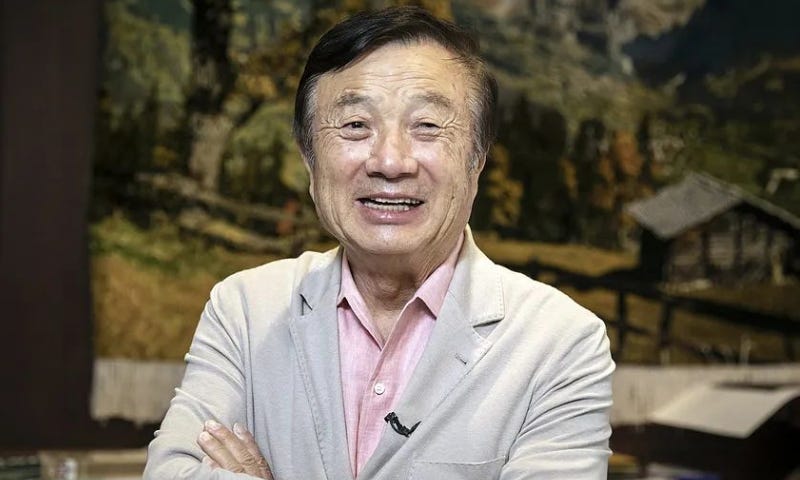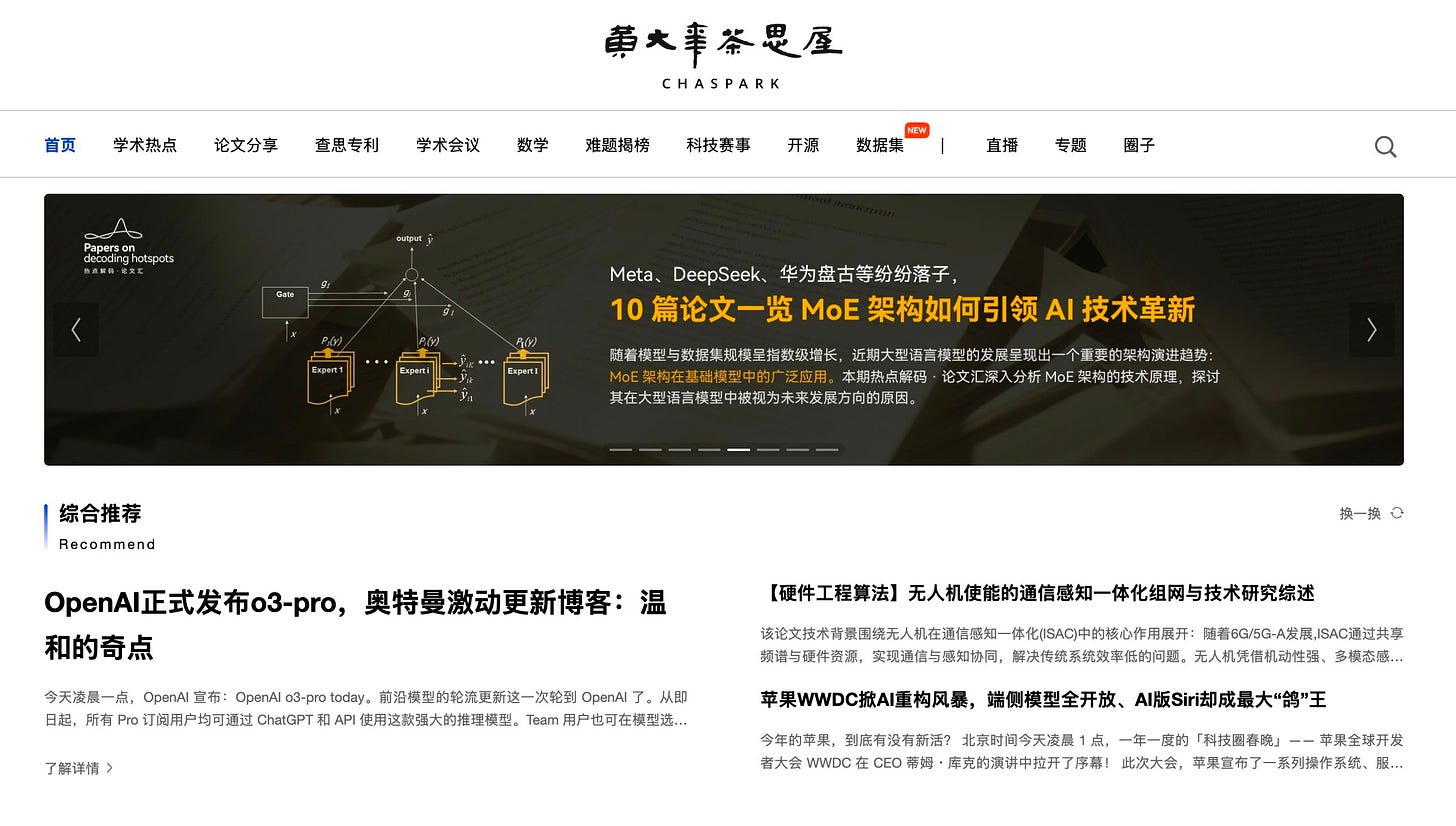Huawei Founder on US v China and Basic Research
an annotated translation
Today we’re running an interview of Huawei founder Ren Zhengfei that made it to the front page of yesterday’s People’s Daily, the premier Party outlet.
What struck out to me in the Q&A was just how hard he hit on the importance of basic research to long term competitiveness. “Without basic research,” Ren says, “there are no breakthroughs, and we’ll never catch up with the U.S.” The People’s Daily giving Ren Zhengfei the airtime to promote this view underscores just how central China’s leadership today sees this work.
We’ve covered the US side of how the Trump administration may be killing our golden goose in this regard with its treatment of the NSF, NIH, university ecosystem and immigration system in recent episodes on America’s R&D Reckoning, our interview with Josh Wolfe of Lux, and a recent op-ed on the war on S&T talent.
This translation also serves as a reminder to subscribe to Manoj Kewalramani’s excellent and meditative daily People’s Daily recaps in his substack Tracking People’s Daily.
"The more open a country is, the more it drives us to progress" — A Dialogue with Ren Zhengfei
By reporters Hu Jian and Chen Jiaxing People's Daily (June 10, 2025, Page 1)
Recently, at Huawei headquarters in Shenzhen, focusing on some hot topics of public concern, a group of People's Daily reporters had an in-person interview with Huawei CEO Ren Zhengfei.
Q: Facing external blockades and pressure, encountering many difficulties, what are your thoughts?
A: I haven't thought about it—thinking about it is useless. Don't think about difficulties—just get on and do it [干就完了] and move forward step by step.
Q: Ascend chips have been "warned on" about usage risks [BIS . What impact does this have on Huawei?
[BIS in mid-May warned firms anywhere in the world that using Huawei Ascends, which were almost certainly fabbed by TSMC under false pretenses, would be considered a violation of export controls. The Information recently reported that “The fallout [from this BIS action] was swift: one Chinese data center firm promptly halted even the small order of Huawei chips it had planned to make, while its legal team scrambled to understand how it could comply with the regulations, according to one person with direct knowledge of the change. Meanwhile, executives at ByteDance and Tencent, both of which have significant business footprints outside China, worry adopting Huawei chips would invite scrutiny from the U.S. government, according to people familiar with their thinking.”]
A: There are many chip companies in China, and many of them are doing quite well—Huawei is just one of them. The US has exaggerated Huawei's achievements; Huawei isn't that formidable yet. We need to work hard to live up to their assessment. Our single chips are still one generation behind the US.
[The incentives are interesting here. On the one hand you have Jensen Huang going around saying Huawei is an enormously powerful competitor who dropped Nvidia’s China market share from 95% to 50%—even though, as the Information very generously put it, “Market share data to confirm Huang’s statement is hard to find.” Jensen, of course, wants the US government to lift export controls not on semiconductor manufacturing equipment but his ability to sell AI chips and racks into China.
The Chinese government and Huawei have every incentive to sandbag Huawei and SMIC’s capacity to compete. They’ve deeply internalized the backlash from Made in China 2025 and want the Trump administration to think that easing export controls on inputs to semiconductors and not investing in the state capacity to enforce the current ones is less of a give than it appears.]
We use mathematics to compensate for physics, non-Moore's to compensate for Moore's [用数学补物理、非摩尔补摩尔], and cluster computing to compensate for single chips. In terms of results, we can still achieve practical applications.
[For more color here, see SemiAnalysis’ coverage of the CloudMatrix 384, Huawei’s answer to Nvidia’s rack solutions]
Q: If there are difficulties, what are the main ones?
A: Difficulties are just difficulties—when hasn’t humanity faced them? Wasn't slash-and-burn agriculture difficult? Wasn't the Stone Age difficult? When humans used stone tools, how could they have imagined high-speed rail? China has opportunities in mid-to-low-end chips, with dozens or hundreds of chip companies all working very hard. Especially in compound semiconductors, the opportunities are even greater. For silicon-based chips, we use mathematics to compensate for physics, non-Moore's to compensate for Moore's, utilizing cluster computing principles to meet our current needs. Software cannot be strangled [卡不住脖子]—it's mathematical graphical symbols, code, and advanced operators and algorithms stacked together, with no barriers blocking it. The real bottlenecks lie in education and talent pipelines. China will eventually have hundreds or thousands of operating systems supporting progress in Chinese industry, agriculture, healthcare, and more.
Q: Huawei is getting a lot of praise and public recognition these days.
A: Praise brings pressure. A bit of scolding keeps us clear‑headed. We make products; once people use them they will criticize—that’s normal. We allow criticism. As long as people tell the truth—even if it’s negative—we welcome it. Praise or blame shouldn’t matter; what matters is whether we can do our job well. If we do, there’s no problem.
Q: From your attitude toward difficulties and criticism, we sense you have a strong inner core—not caring whether it's praise or criticism, but firmly doing your own work well. This should be an important reason why Huawei has come this far.
A: There's still too much praise for us. People should pay more attention to understanding those engaged in basic research. They are highbrow and solitary [曲高和寡—literally ‘difficult songs find few singers’], ordinary people don't understand them, and it takes decades or centuries to see their contributions. Groundless accusations against them are detrimental to the country's long-term development. We need to understand and support those doing theoretical work. We need to understand their broad-mindedness—their great anonymity is our country's hope. Don't elevate one while suppressing another; those engaged in theoretical research are the hope of our nation's future.
"Basic research scientists are lonely—we must have strategic patience and understand them"
Q: How do you view basic research?
A: When our country possesses certain economic strength, we should emphasize theory, especially basic research. Basic research doesn't just take 5-10 years—it generally takes 10, 20 years or longer. Without basic research, you plant no roots. And without roots, even trees with lush leaves fall at the first wind. Buying foreign products is expensive because their prices include their investment in basic research. So whether China engages in basic research or not, we still have to pay—the question is whether we choose to pay our own people to do this basic research.
Q: Regarding basic research, people might not understand the point of it.
A: Scientific breakthroughs—there are inherently few people in the world who understand them, so those who don't understand shouldn't evaluate them. Einstein's discovery that light bends was only proven a hundred years later. In Guizhou, there's an agricultural scientist named Luo Dengyi. In the 1940s, when analyzing the nutritional components of fruits and vegetables, he discovered a wild fruit called cili [刺梨] with very high vitamin content. China was still in the Anti-Japanese War period, education levels were low, and few understood. Later he wrote a paper saying cili was the "King of Vitamin C." After nearly a century, Guizhou has made it into a natural vitamin-rich cili beverage, a luxury item among vitamin drinks at nearly 100 yuan per bottle, highly sought after. The cili industry has become a channel for farmers to escape poverty and become prosperous. Only then did people truly recognize Luo Dengyi, who worked at a broken table during the flames of the anti-Japanese war.
[A deep cut by Ren Zhengfei here but this does look incredibly tasty!]
Q: Many results that look irrelevant at first yet turn out to be hugely useful.
A: Theoretical scientists are lonely; we must have strategic patience and empathize with them. Tu Youyou’s discovery of artemisinin is one case; So was Huang Danian, who embodied "exploring innovation and serving the country with utmost sincerity." The symbols, formulas, and thinking in their minds can only be communicated with by a few people in the world. We must respect theoretical scientists because we don't understand their culture. Society must be tolerant, and the nation must be supportive.
Q: Basic research takes a long time, but companies must deliver returns.
A: We spend roughly 180RMB billion a year on R&D; about 60 billion goes to basic research with no KPIs, while around 120 billion is product‑oriented and is assessed. Without basic research, there are no breakthroughs, and we’ll never catch up with the U.S. [没有理论就没有突破,我们就赶不上美国].
Q: That’s true long‑termism. We heard Huawei even has a “Huang Danian Tea‑Thinking Room.”
A: Professor Huang was a great scientist. China noticed him during the Gulf War: the U.S. used a pod under helicopters to detect Saddam’s buried weapons and destroy them instantly—that pod had been developed by Huang at a UK university. He later resigned from his UK university position and taught at Jilin University. He spent his own money to get a 40 m² room, offering free coffee so students could “absorb cosmic energy over a cup of coffee.”
[Honestly this looks pretty lame, Huawei didn’t do the guy justice with this underwhelming study hall]
We have his family’s authorization to use his name for a non‑profit online platform—the Huang Danian Tea‑Thinking Room—where anyone can freely access global scientific information.
We also keep the “mouth of the funnel” wide open for basic research, partnering with universities. These are strategic investments with no performance metrics. Internally, we accept that we don’t know when theoretical work will bear fruit and impose no demands on the scientists.
“One purpose of socialism is to advance society”
Q: [A cringe leading question here…] Economist Richard Wolff and others argue that the U.S. lacks a high‑speed rail system because capitalism demands profit, while China’s socialist approach values social benefit: high‑speed rail, heavy‑haul lines, advanced power grids, expressways, rural cement roads, irrigation works, power plants… none make money directly, yet they underpin modernization. Competitive goods, meanwhile, are market‑regulated. What’s your view?
A: Why is it that only socialism tackles unprofitable tasks? One goal of socialism is precisely to develop society. China’s socialist market‑economy model is a magnificent undertaking. In infrastructure we had to follow this path—otherwise high‑speed rail, expressways, dams and so on would never have been built.
Q: What’s your outlook on AI?
A: AI might be humanity’s last technological revolution—barring perhaps fusion power. It will take decades or centuries to unfold. No need to worry; China has many advantages. [This line made leadlines in non-Party media]
Q: What advantages?
A: Hundreds of millions of young people—they’re the nation’s future. The General Secretary has said a nation’s strength rests on cultural flourishing. Technically, AI hinges on ample electricity and advanced networks. China’s power generation and grids are excellent; its communications network is the world’s most developed. The “Eastern Data, Western Computing” vision can become reality. [For more, see ChinaTalk’s past coverage of EDWC.]
Q: Anything else?
A: Chip worries are unnecessary: with stacking and clustering, our computing outcomes match the state of the art. As for software, open‑source ecosystems numbering in the thousands will meet society’s needs. [Wait, earlier in this interview I thought we were stressed about how behind Chinese chips were…?]
Q: How do you see China’s future?
A: After leaving our company, Tom Friedman bought a second‑class high‑speed‑rail ticket on his own to experience China. He later wrote, “I’ve seen the future, and it’s not in America.” [See ChinaTalk’s interview with Ezra Klein where I discuss this Tom Friedman piece with him. I, for one, would not take cues on analyzing China from Tom, who said in his Ezra interview that “Whether I’m writing about China from Washington, or whether I’m writing about China from China, I’m always just writing about America. My goal is to use China as my permanent Sputnik.”]
Q: Friedman said in that piece: “What makes China’s manufacturing juggernaut so powerful today is not that it just makes things cheaper; it makes them cheaper, faster, better, smarter and increasingly infused with A.I.”
A: Fundamentally, algorithms aren't in the hands of IT people, but in the hands of electrical experts, infrastructure experts, coal experts, pharmaceutical experts, and experts from various industries. At the practical level, Chinese manufacturing's application of artificial intelligence is very rapid, and many Chinese models will emerge.
Q: What support do private enterprises need from the state for their development?
A: Rule of law and marketization, with government administration according to law and regulations. Enterprises should focus mainly on value creation, technological breakthroughs, law compliance, and legal taxation. This harmonious development model will gradually release economic vitality.
Q: How do you view openness and development?
A: The country is becoming increasingly open, and openness will drive us to greater progress. Under Party leadership, the nation is administratively unified with smooth policy implementation. The gradual formation of a unified large market is possible and will certainly break through all blockades to achieve great rejuvenation.
[Ren Zhengfei of course got the seat of honor during the the Feb 17 Symposium featuring Xi which doubled as the Party’s olive branch to its leading S&T firms. We covered this meeting here on Xi’s Hard Tech Avengers.]
For more, see other core Ren Zhengfei speeches we’ve translated.





